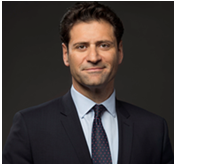Learn more about which bonds are on the move with this weekly podcast. This week we discuss the strengths and risks associated with our latest offering, Maurice Blackburn
Stay tuned for our weekly podcast to learn more about bonds and trade opportunities brought to your by our experts. We would welcome any feedback and questions, if you could please email
clientservices@fiig.com.au.
What would you like to hear more about? For any Bondcast suggestions, please email
sophie.kessler@fiig.com.au
Presenters
 Jake Koundakjian
Jake Koundakjian
Director, Fixed Income Sales
Jake grew up in Ottawa, Canada, where he rose from a teenage bank teller to a portfolio manager overseeing more than $600 million in assets for the Bank of Nova Scotia. With over twenty years in asset management he moved to Australia seven years ago with his family.
 William Arnold
William Arnold
Director, Credit Research - Industrials and Corporates
Will joined FIIG Securities in October 2014 and is responsible for corporate research. Will has over 15 years’ experience in credit and fixed income markets, including six years in London. Past roles include: Fixed Income Analyst at Ignis Asset Management, European Banks Analyst with NabCapital and Senior Credit Risk Advisor at Queensland Treasury Corporation. Will started his career with NAB working in various corporate finance and institutional banking roles.
Transcript
[00:00:00] Sophie Kessler: Hello, welcome to another edition of Bondcast. My name is Sophie Kessler. I'm the Media and Communications Assistant here at FIIG. I'm stepping in for our Director of Education and Research today, Elizabeth Moran, and with me today I have Will Arnold and Jake Koundakjian. Good morning.
[00:00:15] Both: Good morning.
[00:00:17] Sophie Kessler: Today we're going to be talking about our exciting new issue that we've got from Maurice Blackburn. So Jake, do you want to start?
[00:00:24] Jake Koundakjian: Yeah of course. Very excited about this one, a nice four year, 7.45% fixed pay quarterly bond. It's a secured, it’s a secondary...
[00:00:37] Will Arnold: Subordinated, second secured.
[00:00:37] Jake Koundakjian: Yes, this has some early call provisions so if they do want to redeem their bonds early they have to pay us a premium. But yes, robust covenants, quarterly checks... Will, maybe you could fill us in with some more details? I've been studying it as hard as I can for a while...
[00:00:51] Will Arnold: Yeah, well, I think most people will be aware of the name, Maurice Blackburn. Just for a bit of a background there - they've got leading positions in Australia in personal injury litigation, as well as class actions. They've been around for about 100 years. They employ about 1000 staff across Australia – so good geographic diversity.
[00:01:15] Jake Koundakjian: Yeah, it's a pretty familiar name. Certainly I guess on the IPO at 50,000 minimum. I am pretty excited about the deal. It is a pretty small deal overall, 40 million, so I'm hoping to secure as much as possible for investors. Looks like a good overall risk/reward tradeoff in my opinion. They make most of their money from what they call ‘backbone’ legal services.
[00:01:45] Will Arnold: It's personal injury litigation which is core and it provides, I guess, their book is highly diversified against smaller cases which requires some risk mitigation. So just thinking about some positives and credit weaknesses of the deal, I guess. The strengths, like I said, they've got a large footprint across Australia and good diversity, sound diversity, across business lines. It's also a sector less affected by economic conditions.
[00:02:20] Jake Koundakjian: Yeah, that's right, non cyclical.
[00:02:22] Will Arnold: It's relatively defensive. I guess one thing we should touch on is how these guys differ from, for example, Slater and Gordon…
[00:02:40] Jake Koundakjian: Yeah, the elephant in the room.
[00:02:40] Will Arnold: …which has been talked about in the press quite a lot. So just a bit of background on Slater and Gordon. They listed, so Maurice Blackburn isn't a listed entity. Slater listed and they chased a role up growth strategy, where they, I think purchased around 40 businesses for half a billion dollars since 2007 and then went on to buy a large UK business, called Quindell, for $1.3bn. And that's where some of the issues started arising and they got into some troubles.
[00:03:18] Jake Koundakjian: One of the covenants on this deal is they can't go for too many acquisitions, is that right? Maximum $5m a year.
[00:03:26] Will Arnold: That's right. So Maurice Blackburn have said they're comfortable with their current footprint in terms of offices in Australia and they're not actively seeking acquisition and their history has been limited in terms of acquisition. But we've also got that protection you were talking about in the bond documents where any acquisitions are limited to $5m per annum.
[00:03:54] Jake Koundakjian: They are also pretty successful at winning cases, from what I can see. A very strong success rate, over 90% of what they call their backbone business, personal liability litigation. And on the class action, which I guess you see the commercials on telly. The class actions are pretty successful, about an average recovery rate of about 88% in those as well. From what I read, that's pretty good. I guess they make about 20% of revenue from the class actions, about 77 from their backbone legal services. So, non cyclical in nature which I like quite a bit and 7.45% quarterly pay fixed is pretty attractive in my opinion. Maybe, you can fill us in on the risks and what we should be concerned about Will?
[00:04:37] Will Arnold: Yes, so we've talked about Quindell and the issues impacting them and how they’re structured to mitigate those and it's not Maurice Blackburn's intention to follow that path anyway. I guess one of the main risks is regulatory. Obviously, this sector is highly regulated at a federal and at a state level. And changes there are difficult to predict and changes can be like decreasing the maximum amount of legal fees which can be recovered and those types of things. So those types of changes could have a material impact on the business. I guess thinking about that, the business doesn't see any changes on the horizon.
[00:05:36] Jake Koundakjian: Hard to predict. I mean obviously they've gone through about a hundred years of different regulatory bodies. And what I always like to ask is, why do they need the money? They're going so well, in my opinion, from what I see, so maybe you could fill me in a bit Will?
[00:05:47] Will Arnold: Yeah, so they're refinancing away from their current bank. And basically it's replacing the facilities there and also getting a little bit more growth capital. They're pushing into litigation funding - a small proportion.
[00:06:13] Jake Koundakjian: Yeah well, I imagine they're probably funded by one of the big four banks out there and given I think they're now pursuing AMP and CBA, I think Maurice Blackburn is pursuing them… So you can imagine there might be a conflict if one of the big four banks could be pursued by Maurice Blackburn, they won't provide the funding for that.
[00:06:32] Will Arnold: Yes, so there is potentially a conflict of interest for a bank if Maurice Blackburn enters a class action against its funder. So some funders have decided not to continue their facilities and that gives an opportunity to non bank financiers like FIIG. And that is the reason why the bond is on issue.
[00:06:58] Jake Koundakjian: Yeah, we're part of a syndicate right. There's not just us. It's $80m across.
[00:07:04] Will Arnold: That's right, it's $80m in total lending - $40m for us and $40m from a syndicated lender and they have the senior position and we have a second ranking charge after that.
[00:07:18] Jake Koundakjian: Excellent, well, look I'm pretty excited, I like it. I wish I had more of it to access some more of it. We'll see how we go.
[00:07:25] Sophie Kessler: Great guys. Thanks so much. I think that wraps up another edition of BondCast this week.
[00:07:31] Both: Thanks Sophie.